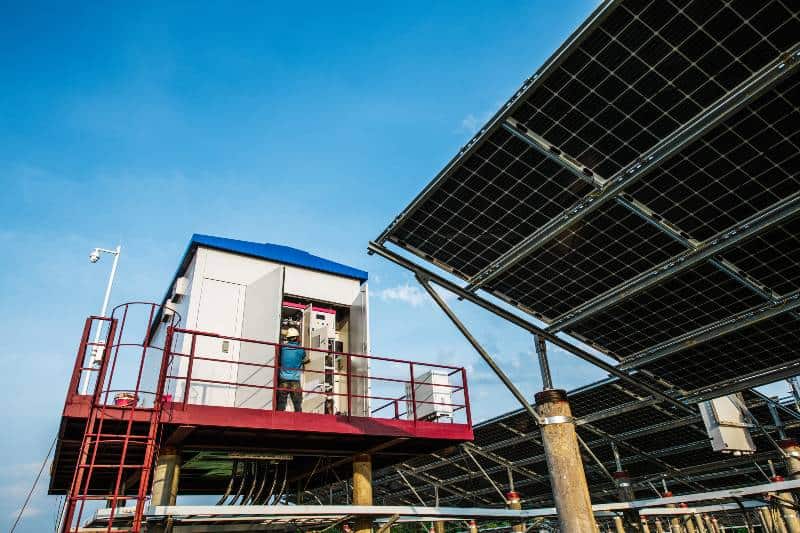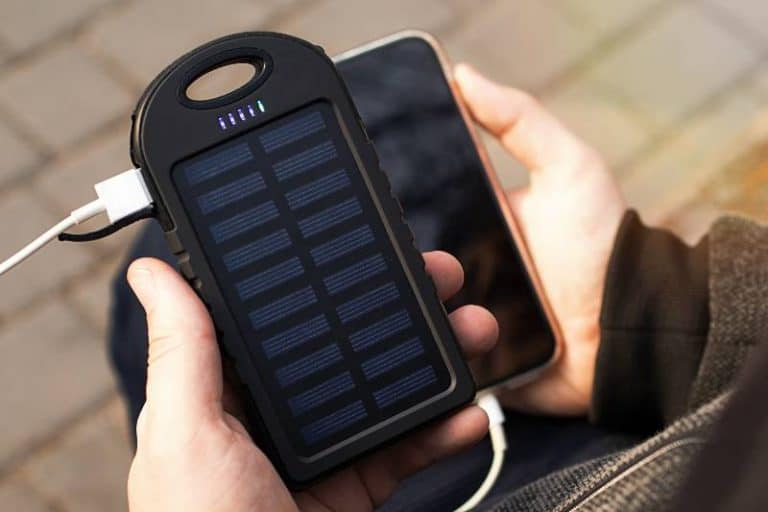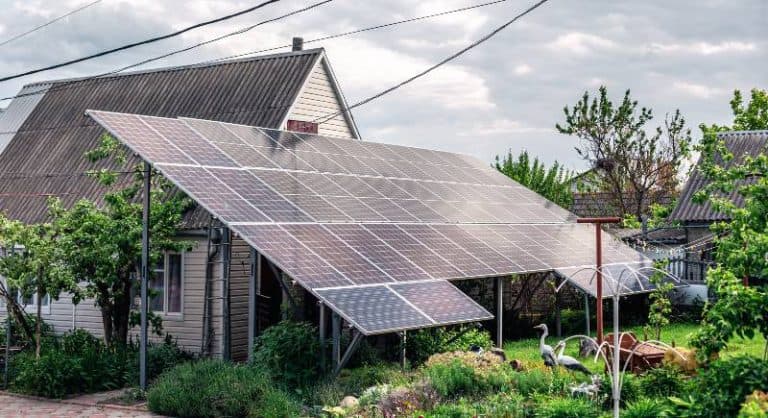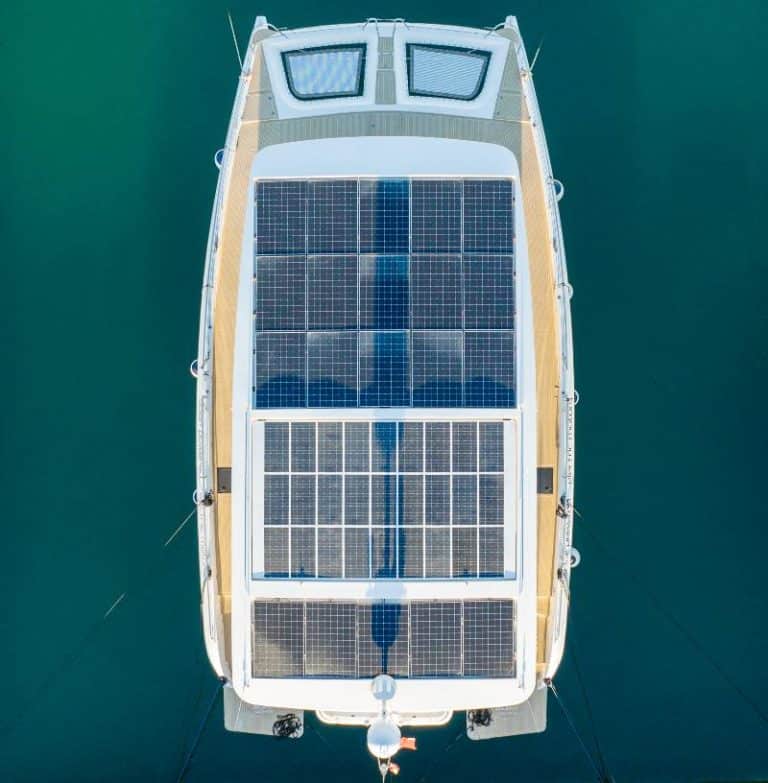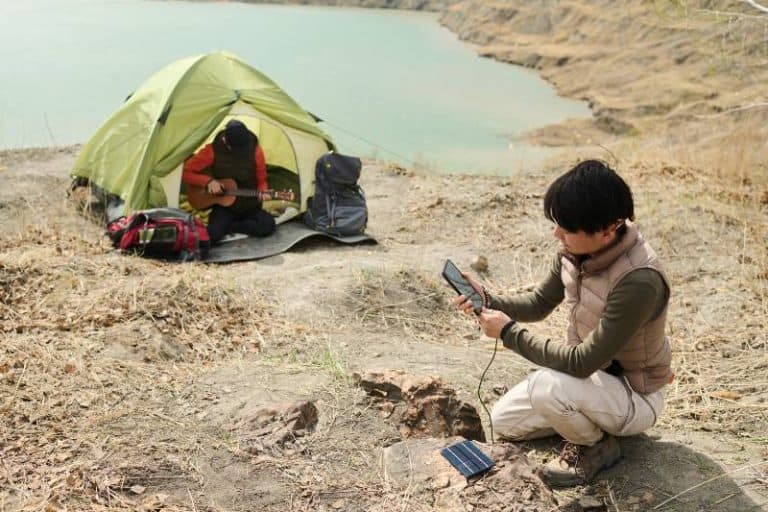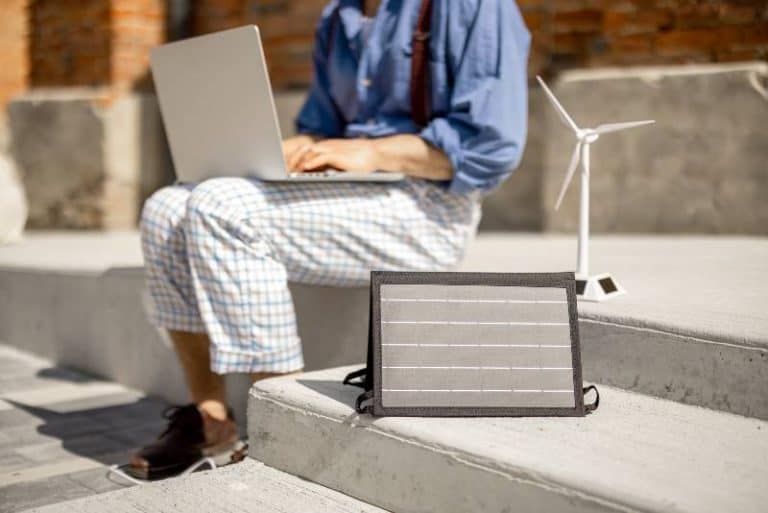How Does a Solar Generator Work? (The Complete Guide)
A solar generator is a device that converts sunlight into electrical energy. This energy can be used to power lights, appliances, or other electronics. Solar generators are a great way to reduce your reliance on traditional electricity, and they can also be used as a backup in case of an emergency. In this blog post, we will discuss the different components of a solar generator and how it works!
A solar generator works by using solar panels to collect energy from the sun and then storing that energy in a solar battery that is built into the generator. The energy is then turned into alternating current (AC power) by an inverter before it can be used in home appliances and other electronics.
Key Takeaways
- A solar generator is a portable power source that uses the sun’s energy to charge batteries.
- Solar generators can be used for anything that requires electricity, including powering lights, phones, laptops, home appliances, and more.
- Solar generators are more efficient than traditional generators
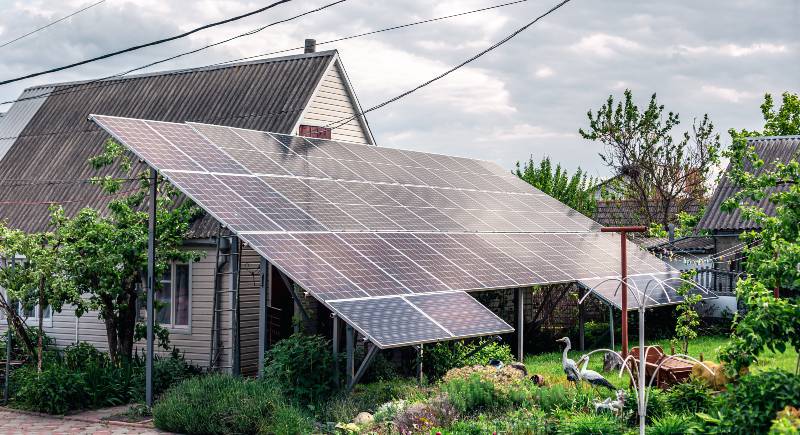
What is a solar generator?
At the end of the day, any device that can harness solar power is technically a solar generator.
While the term “solar generator” is used in a broad sense, most of the time it refers to a portable power station setup like the ones we sell at Bluetti Power.
These advanced devices have solar panels built right in, and they’re able to store the energy they harvest in their own onboard batteries (usually comprised of lithium-ion technology).
Solar generators aren’t always the best solution for large houses, but they’re great for boats, RVs, and emergency backups in case of power outages.
How does a solar generator work?
Emergency Home Power
A solar generator is a device that converts sunlight into electrical energy. The process begins with photovoltaic cells, which are made of materials that absorb sunlight and create an electrical current. This current is then stored in batteries, and the batteries can be used to power electrical devices when the sun is not shining. Solar generators are becoming increasingly popular as a source of emergency home power, as they can provide electricity even when the power grid is down. In addition, solar generators are free of emissions and fuel costs, making them a more environmentally-friendly option than gas-powered generators.
Can Be Used Indoors
One advantage of solar generators is that they can be used indoors. Unlike traditional generators, which require a steady supply of fuel, solar generators can be powered by simply placing them in a sunny location. This makes them an ideal option for emergency power or for powering devices in remote locations where there is no access to the electrical grid.
Saves you money
Another key benefit of solar generators is that they can help you save money in the long run. Because they are powered by sunlight, you will not have to pay for fuel or maintenance costs. And since our power stations come with built-in inverters and battery banks, they are ready to go right out of the box–no installation required.
Offer Peace of Mind
In addition to saving you money, solar generators can help you achieve peace of mind by providing a reliable source of emergency power. If the power goes out for any reason–whether it’s due to a storm, blackout, or another unforeseen event–you will be able to keep your lights on and stay connected with loved ones. And unlike gas-powered generators, which can be loud and dangerous, solar generators are quiet and safe to use indoors.
Better for the Environment
Solar generators are better for the environment than traditional gas-powered generators. Because they only use clean energy from the sun, these devices have zero emissions and do not contribute to air or water pollution. So if you care about reducing your impact on the planet and protecting natural resources, a solar generator is a smart choice.
Can Power Your Whole House
While traditional gas generators are only capable of powering a small number of devices at one time, solar generators can power your whole house. They come with powerful battery banks that can provide enough energy to power all of the appliances and electronics in your home–even the ones you use on a regular basis. With a solar generator, you won’t have to worry about your lights going out or losing power during a storm.
Why solar generators are essential?
Solar generators are essential for a variety of reasons. They provide a reliable source of emergency power, which is crucial in the event of blackouts and other disasters that can disrupt access to electricity. In addition, solar generators have zero emissions, making them better for the environment than traditional gas-powered generators. And because they can be powered by sunlight, they are a cost-effective choice that can help you save money over the long term. Whether you need to power your whole house or simply keep your essential devices running during an outage, solar generators are an essential tool for any household.
Solar Generator vs. Fuel Generator
There are many differences between solar generators and fuel generators. While traditional generators use gas or other fossil fuels to generate electricity, solar generators rely on clean energy from the sun. This makes them a more environmentally-friendly choice, as they do not produce harmful emissions or contribute to air or water pollution.
Reliability
In terms of the amount of time that the power is available, generators powered by batteries, solar panels, or the sun have an advantage over generators powered by gas. For instance, if you connect a generator that runs on batteries to a solar energy system, the generator will be able to continue recharging itself or storing energy.
Pollution reduction
Solar generators and fuel generators are two popular options for powering your home or business. Both have their pros and cons, but when it comes to reducing pollution, solar generators are the clear winner. Solar generators rely on renewable energy from the sun, so they don’t produce any emissions. Fuel generators, on the other hand, run on gasoline or diesel, which release harmful pollutants into the air.
In addition, solar generators are more efficient than fuel generators, so they save you money on your energy bill. As more people become aware of the environmental impact of their choices, solar generators are sure to become even more popular.
Life span
For many people, the decision of whether to buy a solar generator or a diesel generator comes down to one thing: money. Solar generators cost more upfront, but they offer significant savings over time. Diesel generators may be less expensive to purchase initially, but they incur ongoing costs for fuel and maintenance. Solar generators also have a much longer lifespan, allowing you to get many years of use out of them before needing to replace them.
As a result, solar generators are often the more cost-effective option in the long run.
On-grid solar generators
Another important consideration when choosing a generator is whether to go on or off the grid. On-grid solar generators are connected to your local electric company, and they can help you save money by using energy that would otherwise be wasted. Off-grid generators provide power independently from your local utility company, allowing you to use them even when the grid is down.
Overall, solar generators are versatile and reliable power sources that can help you stay connected to your home or business during emergencies.
Whether you need a whole-house solution or just want to keep essential devices running, they offer many benefits over traditional fuel generators.
Off-grid solar generators
Solar generators are a great option if you’re looking to save money in the long run. Once you’ve installed the solar panels, there are no ongoing fuel costs. Solar generators are also very low maintenance, as there’s no need to change spark plugs or add oil. On the downside, solar generators can take longer to set up and may not produce as much power as fuel generators. They also don’t work well in cold weather.
Fuel generators, on the other hand, are more expensive to operate, as you’ll need to purchase fuel regularly. However, they’re generally much easier to set up and tend to produce more power than solar generators. Fuel generators also work well in all weather conditions. The main downside of fuel generators is that they’re not as environmentally friendly as solar generators.
Hybrid solar generators
Because solar energy is the most abundant and least expensive source of energy, hybrid systems are typically set up to allow excess solar power to be used to charge the batteries. When the batteries reach their capacity, you can begin selling any excess solar power to the grid in order to generate revenue.
The battery inverter will do its best to provide power from the battery even when there is not enough solar energy to power your home. In the event that it is unable to provide sufficient power (remember that power is measured in kW) because it has reached its power rating, or in the event that it is unable to provide sufficient energy (kWh) because it is running low, then the grid will make up the difference.
In hybrid solar systems, the batteries are typically sized to provide enough power to get you through the night, but they are also able to continue producing power during the day if necessary. When your home is powered by a hybrid system, solar energy is used first, followed by power from batteries, and finally, the power from the grid is used as a fallback. Some hybrid systems can provide limited backup from your batteries in the event that you lose power from the grid, allowing you to keep the lights on and some of your appliances operational.
Benefits of using a solar generator
Access to an unlimited supply of solar energy
One of the best things about using a solar generator is that it gives you access to an unlimited supply of solar energy. This means that your solar generator can be used anywhere, in any situation, and at any time. If you’re out camping or hiking, camping or hiking—you get the idea—you’ll have an endless power source.
Low maintenance costs
You don’t have to worry about maintenance and repairs when you use a solar generator. The solar panels that power the system are designed to last for decades with very little effort on your part. You’ll never have to worry about replacing them or doing anything else to keep your system running smoothly.
You can read about the lifespan of a solar power system here!
Quiet and clean operation
Solar generators are quiet and clean, which means they can be used almost anywhere.
With a solar generator, you don’t have to worry about noise or fumes. You can plug in your appliances and run them without any issues—and if you do encounter a problem, it’s easy to find the source because there are no fumes or clunky engines to deal with.
Investment Opportunity
If you’re looking for a great investment opportunity, you might want to consider investing in a solar generator. These generators are becoming increasingly popular as they become more affordable and reliable.
Solar generators are able to power your home or business without having to rely on the grid, which means that you won’t have to pay any monthly bills or worry about getting disconnected if there’s a power outage. The best part is that these solar generators are completely self-sufficient—they don’t need any fuel or electricity from another source. This makes them incredibly reliable and cost-effective.
If you’re looking for an investment opportunity that will provide you with peace of mind and financial security, then investing in a solar generator may be just what you need!
Light and easily transportable
Solar generators are the perfect option for anyone who needs a reliable power source that’s easy to transport and store. They’re also incredibly safe—you won’t have to worry about them catching fire or exploding as gasoline-powered generators do!
Ideal option for power backup
If you live in an area that’s prone to power outages, then a solar generator will be the ideal option for you. With one of these generators on hand, you can rest assured that your home will always have power when needed.
Should you buy a solar generator?
Solar generators are the best option if you want a portable power source that will last for years, but they’re not the only option. If you’re looking for something that’s more convenient, or if you’re just starting out with solar power and not sure whether you want to invest in a solar generator yet, there are other options available.
Solar generators are powerful and reliable, but they’re also expensive. Their high price tag can make them hard to justify for casual use, so it’s important to consider what exactly you’ll be using your solar generator for before purchasing one.
A solar generator can be used for camping trips or other outdoor activities like boating or off-roading where having access to electricity is essential. Also, if you live in an area that gets frequent power outages—like during hurricanes—a solar generator is a great investment because it will keep providing power even when your home’s main power source fails.
However, if your main concern is keeping your cell phone charged while camping or sailing on vacation (or just powering some lights), then buying a portable battery instead might be enough to meet your needs without breaking the bank.
What is the best battery for a solar generator?
Lead-acid
Lead-acid batteries are durable and can last for decades if they’re taken care of properly. They’re also cheap, which means that you can get a lot of power for your money when you use them in your solar generator.
Lithium-ion
Lithium-ion batteries are the best because they have the highest energy density, which means they can store more power in a smaller space. This makes them ideal for use in solar generators, where space is limited and weight must be kept to a minimum.
Saltwater
Saltwater batteries are the most efficient at storing energy and have the longest lifetime. That’s because the electrolyte in saltwater batteries is made of salt and water, which means there’s no acid to corrode the battery. This also means that if you spill saltwater on your clothes, you won’t burn your skin—it’s just water!
The main downside of saltwater batteries is that they’re more expensive than lead-acid or lithium-ion batteries, but they’ll last much longer than either of those types of batteries.
What will and won’t run well on a portable solar generator?
Portable solar generators are great for powering up your phone, laptop, and other electronics. But what about larger items like a fridge? Or a water heater?
The short answer is: it depends on the wattage of your device, and how much energy you need to use in a single day.
If you’re planning to run an air conditioner or microwave, you’ll need more than 1,000 watts of power—and that’s not even including the energy needed to keep those devices cool while they’re running! That’s why portable solar generators aren’t meant for powering those kinds of appliances. However, if you have a smaller electric device like an alarm clock or coffee maker that only needs 100-500 watts of power (about 10-20% as much as what an air conditioner uses), then yes—it should work fine with your portable solar generator.
For appliances that need more than 500 watts of power (like electric water heaters), we recommend using our commercial-grade generators instead—they’re designed to handle heavy loads like these without breaking down over time.
Disadvantages of Using Solar Generators
High primary cost
Solar generators are expensive to buy. The average price is about $800, which is more than most people want to pay upfront for an emergency device.
Limited power supply
Solar generators are great for small tasks, but not for powering large appliances. If you’re looking for something that can power your entire house during an emergency, then solar generators aren’t right for you.
Limited energy output
The output of a solar generator is limited because it depends on the amount of sunlight available. If you’re in an area with little to no sunlight, then your solar generator won’t be able to function at all during those times. In addition, there are storms that can block out the sun completely, leaving you without any power at all when you need it most.
Proper Storage for Solar Generators
Monthly cleaning
Monthly cleaning is important, especially if you have a portable solar generator. If you don’t store your unit properly and allow dust or dirt to build up on the battery, it can reduce its lifespan and overall effectiveness.
Annual inspection
A full inspection of your solar generator should be performed by a professional once per year. This will ensure that the unit is working correctly and that there are no leaks in any components of the system. In addition, it keeps you informed about any new technology that may be available for purchase so that you can consider upgrades if necessary.
Clean as often as needed
A solar generator should be cleaned as often as needed. For example, if you live in a dusty area or have pets that track dirt into your home, it is important to clean the unit frequently. You can use a soft cloth with water and mild soap if needed.
How Does a Solar Generator Work FAQs
Do solar generators need electricity?
A solar generator works by converting sunlight into an electrical current, which passes through a charge controller. The solar panel needs direct sunlight as the source of its energy—a renewable form that can then be used to power the world around us!
Do solar generators work at night?
Yes! A solar generator can still work at night, but it will not be able to generate as much power. The sun is the primary source of energy for a solar generator, so if there is no sunlight available during the day or night, it will not generate electricity.
How many hours will a solar generator last?
Depending on the model, a solar generator can last anywhere from 8 to 48 hours. The more powerful your solar generator is, the longer it will last in between charges.
Conclusion
As is the case with solar power mechanics in general, there is no one-size-fits-all answer for why a solar generator might be best for you. However, if you’re looking for a highly portable solution to power small appliances during emergencies or remote camping excursions, nothing quite beats the mobility and reliability of a solar generator.
If you want to learn more about solar panels, check out our articles here!
